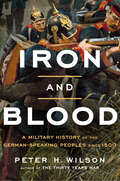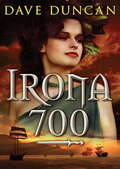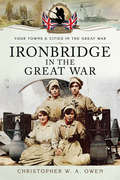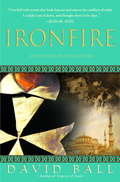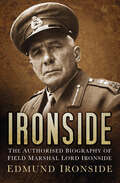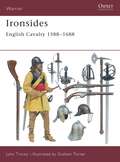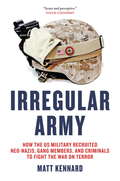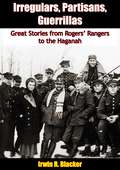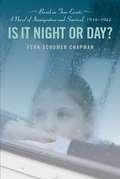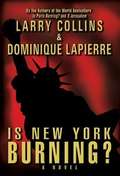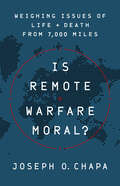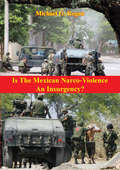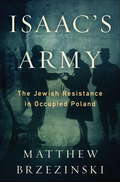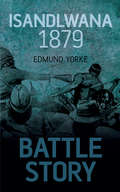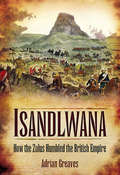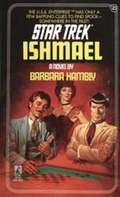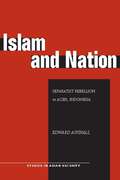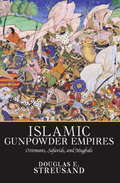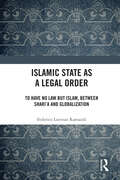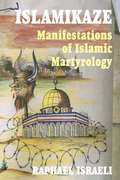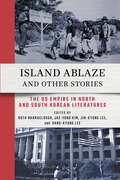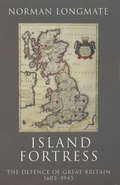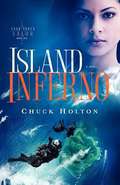- Table View
- List View
Iron and Blood: A Military History of the German-Speaking Peoples since 1500
by Peter H. WilsonFrom the author of the acclaimed The Thirty Years War and Heart of Europe, a masterful, landmark reappraisal of German military history, and of the preconceptions about German militarism since before the rise of Prussia and the world wars.German military history is typically viewed as an inexorable march to the rise of Prussia and the two world wars, the road paved by militarism and the result a specifically German way of war. Peter Wilson challenges this narrative. Looking beyond Prussia to German-speaking Europe across the last five centuries, Wilson finds little unique or preordained in German militarism or warfighting.Iron and Blood takes as its starting point the consolidation of the Holy Roman Empire, which created new mechanisms for raising troops but also for resolving disputes diplomatically. Both the empire and the Swiss Confederation were largely defensive in orientation, while German participation in foreign wars was most often in partnership with allies. The primary aggressor in Central Europe was not Prussia but the Austrian Habsburg monarchy, yet Austria’s strength owed much to its ability to secure allies. Prussia, meanwhile, invested in militarization but maintained a part-time army well into the nineteenth century. Alongside Switzerland, which relied on traditional militia, both states exemplify the longstanding civilian element within German military power.Only after Prussia’s unexpected victory over France in 1871 did Germans and outsiders come to believe in a German gift for warfare—a special capacity for high-speed, high-intensity combat that could overcome numerical disadvantage. It took two world wars to expose the fallacy of German military genius. Yet even today, Wilson argues, Germany’s strategic position is misunderstood. The country now seen as a bastion of peace spends heavily on defense in comparison to its peers and is deeply invested in less kinetic contemporary forms of coercive power.
Irona 700
by Dave DuncanFantasy at its most enchanting: An original and absorbing tale from a master storyteller about the profound effects of a single life on the battle against ultimate evil It is Midsummer Day, the beginning of the year 700, in the city of Benign. All the children born in the year 684 celebrate their joint sixteenth birthday by passing in front of the statue of the blind goddess Caprice--but only one will become the Chosen and join the Seventy who govern and guide the city. Much to her surprise, Irona Matrinko, one of the many children of an impoverished fisherman, is chosen. Irona 700 moves into the palace and, with the help of a new mentor, recognizes and cultivates her great talent for guiding wars: strategy and tactics, leadership and inspiration. As Irona gives her life to the city, an ancient enemy, Maleficence, attacks again and again, corrupting Irona's friends, destroying her lover, and continually defeating her grandest plans for peace and harmony. Along the way, Irona becomes a masterful politician, a shrewd judge of character, and, even at great cost to her personal happiness, a true heroine.
Ironbridge in the Great War (Your Towns & Cities in the Great War)
by Christopher W. OwenFamed as the birthplace of modern industry and the first cast iron metal single span bridge, Ironbridge is venerated the world over yet its social history is at times unfamiliar.One hundred years ago this sleepy town, set by the river Severn, willingly volunteered its lifeblood to a war that everyone confidently believed would be a short-lived, adventurous romp. Misled by government propaganda, they soon discovered through fighting relative's letters and various official news reports, many of which are unearthed for the first time throughout this book, that it had rapidly degenerated into an endless morass of bloody violence with the probability of their men meeting a painful death on a daily basis thrown in for good measure.The town's wartime heritage is one of enterprise and hard work as the majority of the Great War gun-fodder comprised working-class men drawn from prestigious local companies. Maw & Co, the world-famous ceramic tile maker, raised its own company of enlisted fighting men, in common with other businesses nationwide, that were known as Pals Battalions. As in most instances across the land, it subsequently paid a heavy price for this mass act of patriotism. Ironbridge also became a cradle of the fledgling women's wartime workforce, who helped produce vital heavy munitions components at another famous local company's works.Ironbridge in the Great War is the story of the town's great sacrifice, as evidenced by the numerous and diverse war monuments that populate the town and its surrounding hamlets. This is detailed work that includes fascinating facts about the town, which, despite being constantly under the world spotlight, remained, until now, a part of its hidden wartime social history.
Ironfire: An Epic Novel of Love and War
by David BallFrom the acclaimed author of Empires of Sand comes a mesmerizing new adventure that Jean Auel cites as “crowded with events that both forecast and mirror the conflicts of today. ” Sweeping from the drawing rooms of Paris to the palace of Suleiman the Magnificent to the dark hold of a slave ship racing across the sea, here is a dazzling story of love and valor, innocence and identity, an epic novel of the clash of civilizations on a barren island where the future was forged. The Mediterranean, the sixteenth century: Lying squarely in the midst of the vital sea lanes between the Christian West and the Ottoman Empire in the East, and ruled by the ancient Order of the Knights of St. John, Malta will become the stage upon which the fate of the world turns. For one of its sons, the hand of violence strikes swiftly, when young Nicolo Borg is seized by Barbary slavers and launched on a remarkable journey to the court of the supreme ruler of the Muslim world. Renamed Asha, plotting his escape even as he swears allegiance to the god of his masters and is schooled in the arts of culture and war, the innocent boy will be transformed into one of the Sultan’s deadliest commanders. For Nico’s beloved sister, Maria, his loss fires her hatred for the knights who did nothing to save him and her dreams of escape from her stifling home. As the headstrong girl grows into a fierce beauty, she will capture the attention of one man in particular, Christien de Vries, a surgeon-knight torn between duty and desire, caught up in Malta’s frantic preparations against the coming Ottoman storm. Around Nico and Maria are men and women who will share their destinies: Dragut Raïs, a brilliant corsair, arch-rival of the knights…Giulio Salvago, a priest in full flight from his carnal nature…Alisa, a young beauty hidden away in a harem…Jean de La Valette, the master knight who is Malta’s only hope for survival. As the mighty Ottoman fleet bears down on the tiny island, as Nico Borg makes his way back to his homeland at the helm of a warship, Ironfire moves inexorably to a shattering climax where all will face ultimate justice in the murderous cauldron of siege warfare. Brilliantly capturing the crosscurrents of a storied age, Ironfire is historical fiction in the grand tradition, a stirring realization of a pivotal moment in time that irrevocably shaped the world we inhabit today. From the Hardcover edition.
Ironside: The Authorised Biography of Field Marshal Lord Ironside
by Richards Edmund Ironside General Lord RichardsThe Field Marshal was a born commander and, besides being a gifted linguist, was mobilised as a Subaltern for the Boer War to act as a secret agent and to streamline the peace process. With an appetite for battle, in WW1 he became the Allied C-in-C of the Expeditionary Force in North Russia and, being ranked as a knighted Major General at the age of 39, he then modernised the Staff training to deal with armoured and aerial warfare. His Generalship was tested out in the Raj and, in 1939, on the day war was declared, the British Army leadership as CIGS was placed in his hands, so that he was able to defend Calais and free-up the BEF escape route to Dunkirk. Back in business as C-in-C Home Forces he was given his baton. Ironside surely had one of the most varied and long military careers of any military leader in the 20th century.
Ironsides
by Graham Turner John TinceyThe Ironside is symbolic of the one occasion when the army took an active role in British politics. He represents a unique period when ordinary people displaced the established order to take political control into their own hands. In the nineteenth century a rash of historical publications, paintings and statues with a civil war theme reflected the political divisions of Victorian society and Royalist and Parliamentarian causes were argued over again, reflecting the sub text of contemporary political struggles. This book attempts to take a wider view of the Ironside as a warrior who evolved from the experiments of the late sixteenth and early seventeenth centuries to combine firepower with the armoured cavalryman.
Irregular Army
by Matt KennardSince the launch of the Afghanistan and Iraq wars--now the longest wars in American history--the US military has struggled to recruit troops. It has responded, as Matt Kennard's explosive investigative report makes clear, by opening its doors to neo-Nazis, white supremacists, gang members, criminals of all stripes, the overweight, and the mentally ill. Based on several years of reporting, Irregular Army includes extensive interviews with extremist veterans and leaders of far-right hate groups--who spoke openly of their eagerness to have their followers acquire military training for a coming domestic race war. As a report commissioned by the Department of Defense itself put it, "Effectively, the military has a 'don't ask, don't tell' policy pertaining to extremism."Irregular Army connects some of the War on Terror's worst crimes to this opening-up of the US military. With millions of veterans now back in the US and domestic extremism on the rise, Kennard's book is a stark warning about potential dangers facing Americans--from their own soldiers.
Irregulars, Partisans, Guerrillas: Great Stories from Rogers’ Rangers to the Haganah
by Irwin R. BlackerOriginally published in 1954, this is a collection of 32 stories from a variety of historic eras filled with missions against all odds."The stories in this collection are generally firsthand accounts by irregulars. The principles of selection were simple: Were they good stories--interesting, exciting and honest? And did they show fresh and different phases of guerrilla warfare? The weightier writings on irregular strategy and the politics of modern partisan warfare were omitted except for T. E. Lawrence's classic chapter on the former and Julian Amery's brilliant and brief analysis of the latter."I have tried briefly to set these stories in time and circumstance. As editor I have tried not to draw the fine lines between resistance which takes place in urban communities and guerrilla warfare which requires space for movement. I have tried not to belabor the differences between regulars as irregulars and the native guerrilla in the field. I have avoided the fine lines drawn between a guerrilla who attempts sabotage and the saboteur, the guerrilla who collects intelligence and the spy. In short, if too rigid a definition is observed, a fascinating and vital subject could be reduced to a dull and academic one. The irregular's objective is simply to destroy the enemy. This book attempts to tell of the many ways in which he has tried, and is still trying, to do so."--Irwin R. Blacker, Introduction
Is It Night or Day?
by Fern Schumer ChapmanIn 1938, Edith Westerfeld, a young German Jew, is sent by her parents to Chicago, Illinois, where she lives with an aunt and uncle and tries to assimilate into American culture, while worrying about her parents and mourning the loss of everything she has ever known. Based on the author's mother's experience, includes an afterword about a little-known program that brought twelve hundred Jewish children to safety during World War II.
Is New York Burning?
by Larry Collins Dominique LapierreFour years after 9/11, terrorists have hidden an atomic bomb in the heart of New York. If the President of the United States does not force his Israeli allies to abandon all the land they have occupied in the aftermath of the 1967 War, Manhattan will be wiped off the face of the earth. Will George W. Bush give in to this blackmail? Could a terrorist group have really gotten access to an atomic bomb and smuggled it into the United States? Can the forces of the most powerful nation on the planet find the hidden bomb and defuse it before it can explode? Could they, if necessary, evacuate New York? Researched for two years, the authors studied thousands of documents and interviewed scores of people from the most secret centers in the war on terrorism. Is New York Burning? is a diabolical thriller set at the very heart of today's world and its madness. The final collaboration from the authors of the world famous Is Paris Burning? and 0 Jerusalem.
Is Remote Warfare Moral?: Weighing Issues of Life and Death from 7,000 Miles
by Joseph O ChapaAmerica is at an important turning point. Remote warfare is not just a mainstay of post–9/11 wars, it is a harbinger of what lies ahead—a future of high-tech, artificial intelligence–enabled, and autonomous weapons systems that raise a host of new ethical questions. Most fundamentally, is remote warfare moral? And if so, why? Joseph O. Chapa, with unique credentials as Air Force officer, Predator pilot, and doctorate in moral philosophy, serves as our guide to understanding this future, able to engage in both the language of military operations and the language of moral philosophy. Through gripping accounts of remote pilots making life-and-death decisions and analysis of high-profile cases such as the killing of Iranian high government official General Qasem Soleimani, Chapa examines remote warfare within the context of the just war tradition, virtue, moral psychology, and moral responsibility. He develops the principles we should use to evaluate its morality, especially as pilots apply human judgment in morally complex combat situations. Moving on to the bigger picture, he examines how the morality of human decisions in remote war is situated within the broader moral context of US foreign policy and the future of warfare.
Is The Mexican Narco-Violence An Insurgency?
by Michael G. RoganSince Mexican President Felipe Calderón declared war on the drug cartels in Dec. 2006, more than 35,000 Mexicans have died due to narco-violence.This monograph examines whether the various Mexican drug trafficking organizations are insurgents or organized criminal elements. Mexican narco-violence and its affiliated gang violence have spread across Mexico’s southern border into Guatemala, Honduras, and El Salvador. Additionally, the narco-violence is already responsible for the deaths of American citizens on both sides of the U.S.-Mexico border, and the potential for increased spillover violence is a major concern.This monograph argues that the Mexican drug cartels are transnational criminal organizations (TCOs) that pose a national security threat to the regional state actors; however, they are not an insurgency for four reasons. First, none of the cartels have the political aim or capability to overthrow the Mexican government. Second, the various TCOs are competing criminal organizations with approximately 90 percent of the violence being cartel on cartel. For example, the violence in the city of Juárez is largely the result of the fighting between the local Juárez cartel and the Sinaloa cartel for control of one of the primary smuggling routes into the U.S.. Third, the cartels’ use of violence and coercion has turned popular support against them thus denying them legitimacy. Fourth, although the cartels do control zones of impunity within their areas of influence, the Mexican government has captured, killed, and extradited kingpins from every major TCO.
Isaac's Army: A Story of Courage and Survival in Nazi-Occupied Poland
by Matthew BrzezinskiStarting as early as 1939, disparate Jewish underground movements coalesced around the shared goal of liberating Poland from Nazi occupation. For the next six years, separately and in concert, they waged a heroic war of resistance against Hitler's war machine that culminated in the Warsaw Ghetto Uprising. In Isaac's Army, Matthew Brzezinski delivers the first-ever comprehensive narrative account of that struggle, following a group of dedicated young Jews--some barely out of their teens--whose individual acts of defiance helped rewrite the ending of World War II. Based on first-person accounts from diaries, interviews, and surviving relatives, Isaac's Army chronicles the extraordinary triumphs and devastating setbacks that befell the Jewish underground from its earliest acts of defiance in 1939 to the exodus to Palestine in 1946. This is the remarkable true story of the Jewish resistance from the perspective of those who led it: Isaac Zuckerman, the confident and charismatic twenty-four-year-old founder of the Jewish Fighting Organization; Simha Ratheiser, Isaac's fifteen-year-old bodyguard, whose boyish good looks and seeming immunity to danger made him an ideal courier; and Zivia Lubetkin, the warrior queen of the underground who, upon hearing the first intimations of the Holocaust, declared: "We are going to defend ourselves." Joined by allies on the left and right, they survived Gestapo torture chambers, smuggled arms, ran covert printing presses, opened illegal schools, robbed banks, executed collaborators, and fought in the two largest rebellions of the war. Hunted by the Germans and bedeviled by the "Greasers"--roving bands of blackmailers who routinely turned in resistance fighters for profit--the movement was chronically short on firepower but long on ingenuity. Its members hatched plots in dank basements, never more than a door knock away from summary execution, and slogged through fetid sewers to escape the burning Ghetto to the forests surrounding the city. And after the initial uprising was ruthlessly put down by the SS, they gambled everything on a bold plan for a citywide revolt--of both Jews and Gentiles--that could end only in victory or total destruction. The money they raised helped thousands hide when the Ghetto was liquidated. The documents they forged offered lifelines to families desperate to escape the horror of the Holocaust. And when the war was over, they helped found the state of Israel. A story of secret alliances, internal rivalries, and undying commitment to a cause, Isaac's Army is history at its most heart-wrenching. Driven by an unforgettable cast of characters, it's a true-life tale with the pulse of a great novel, and a celebration of the indomitable spirit of resistance.Advance praise for Isaac's Army "Told with care and compassion, Matthew Brzezinski's Isaac's Army is a riveting account of the Jewish resistance in wartime Poland. This is an intense story that transcends the horror of the time and finds real inspiration in the bravery of those who fought back--some of whom lived to tell their stories. Highly recommended."--Alan Furst, author of Mission to ParisFrom the Hardcover edition.
Isandlwana 1879
by Edmund YorkeThe first major encounter between the British Army and Zulu Kingdom, and one of Britain’s greatest military disasters. On January 22, 1879, a 20,000-strong Zulu army attacked 1,700 British and colonial forces. The engagement saw primitive weapons of spears and shields clashing with the latest military technology. However, despite being poorly equipped, the numerically superior Zulu force crushed the British troops, killing 1,300 men, while only losing 1,000 of their own warriors. It was a humiliating defeat for the British Army, which had been poorly trained and which had underestimated its enemy. The defeat ensured that the British had a renewed respect for their opponents and changed their tactics; rather than fighting in a straight, linear formation, known as the Thin Red Line, they adopted an entrenched system or close order formations. The defeat caused much consternation throughout the British Empire, which had assumed that the Zulu were no match for the British Army; thus, the army was greatly reinforced and went on to victory at Rorke’s Drift. Isandlwana puts you at the forefront of the action.
Isandlwana: How the Zulus Humbled the British Empire
by Adrian GreavesThe historian and founder of the Anglo-Zulu War Historical Society presents his groundbreaking account of the Battle of Isandlwana. The story of the British Army&’s defeat at Iswandlwana in 1879 has been much written about, but never with the detail and insight revealed by the research of Dr. Adrian Greaves. In reconstructing the dramatic and fateful events, Greaves draws on newly discovered letters, diaries and papers of survivors and other contemporaries. These include the contemporary writings of central figures such as Henry Harford, Lt Henry Carling of the Royal Artillery, August Hammar and young British nurse Janet Wells. These historical documents, coupled with Greaves&’s own detailed knowledge of Zululand, enable him to paint the most accurate picture yet of this cataclysmic battle that so shamed the British establishment. We learn for the first time of the complex Zulu decoy, the attempt to blame Colonel Durnford for the defeat. Greaves uncovers evidence of another &“Fugitives&’ Trail&” escape route taken by battle survivors, as well as the identity of previously unknown escorts for Lieutenants Coghill and Melville, both awarded Victoria Crosses for trying to save the Colors.
Ishmael (Star Trek: The Original Series #23)
by Barbara HamblyThis unforgettable and suspenseful Star Trek: The Original Series adventure follows the Enterprise crew in a desperate rescue mission to the past to save First Officer Spock and stop the Klingons from changing the future forever. The USS Enterprise is on a peaceful mission at Starbase 12 when a bizarre cosmic phenomenon causes a Klingon ship to suddenly vanish—with Spock aboard for the ride. Spock&’s last message from the Klingon ship is cryptic and frightening. The Klingons are traveling into the past, searching for the one man who holds the key to the furure. If they can kill that man, the course of history will be changed—and the Federation will be destroyed!
Islam and Nation: Separatist Rebellion in Aceh, Indonesia
by Edward AspinallBetween 1976 and 2005 the Free Aceh Movement (Gerakan Aceh Merdeka, or GAM) waged a protracted secessionist struggle against the Indonesian state in the name of Acehnese nationalism. In this study, Espinall (political science and social change, Australian National U. , Australia) conducts an analysis of the origins and development of Acehnese nationalism. He stresses the role of agency, particularly the actions and views of the founder of GAM, Hasan di Tiro; later Acehnese nationalists who came to challenge some of his views; and political actors from Aceh's Indonesian political establishment. He also stresses three central aspects of context: the institutional context of state formation; the international context that shaped the discourse of Acehnese actors, including Acehnese experiences of exile and international law discourses of self-determination; and factors of social context such as kinship networks, ideas about masculinity, and socioeconomic structures. A further major theme is the relationship between Islam and nationalism. Annotation ©2009 Book News, Inc. , Portland, OR (booknews. com)
Islamic Gunpowder Empires
by Douglas E. StreusandIslamic Gunpowder Empires provides readers with a history of Islamic civilization in the early modern world through a comparative examination of Islam's three greatest empires--the Ottomans (centered in what is now Turkey), the Safavids (in modern Iran), and the Mughals (ruling the Indian subcontinent). Author Douglas Streusand explains the origins of the three empires; compares the ideological, institutional, military, and economic contributors to their success; and analyzes the causes of their rise, expansion, and ultimate transformation and decline. Streusand depicts the three empires as a part of an integrated international system extending from the Atlantic to the Straits of Malacca, emphasizing both the connections and the conflicts within that system. He presents the empires as complex polities in which Islam is one political and cultural component among many. The treatment of the Ottoman, Safavid, and Mughal empires incorporates contemporary scholarship, dispels common misconceptions, and provides an excellent platform for further study.
Islamic Gunpowder Empires
by Douglas E. StreusandIn this informative study, Streusand (international relations, US Marine Corps Command & Staff College) presents the history of three early-modern Islamic empires: Ottoman, Safavid and Mughal. Each is treated in a separate chapter but compared to the other two. Streusand concentrates on political and military factors in the rise and decline of the empires but also looks at economic and social aspects of the societies. By viewing the three empires in relation to each other rather than in opposition to Europe, Streusand is able to show similarities and differences among them. The text is extremely readable, intended for upper-division college students but accessible to general readers. He includes a timeline, glossary and charts of rulers. For those who search the past for explanations of current events, this book is both a valuable source and a much-needed corrective to popular misunderstandings. Annotation ©2011 Book News, Inc. , Portland, OR (booknews. com)
Islamic State as a Legal Order: To Have No Law but Islam, between Shari’a and Globalization
by Federico Lorenzo RamaioliThis book explores the legal dimension of the Islamic State, an aspect which has hitherto been neglected in the literature. ISIS’ dystopian experience, intended as a short-lived territorial and political governance, has been analyzed from multiple points of view, including the geopolitical, social and religious ones. However, its legal dimension has never been properly dealt with in a comprehensive way, assuming as a point of reference both the Islamic and the Western legal tradition. This book analyzes ISIS as the expression of a potential though never fully realized legal order. The book does not describe ISIS’ possible classifications according to the standards and the criteria of international law, such as its possible statehood or proto-statehood, issues that are however touched upon. Rather, it analyzes ISIS’ own legal awareness, based on the group’s literary materials, which show a considerable amount of juridical work. Such material, mainly propagandistic in its nature, is essential in understanding which kind of legal order ISIS aimed at establishing. The book will be of interest to students and academics in the fields of Law, International Relations, Political Sciences, Terrorism Studies, Religion and Middle Eastern Studies.
Islamikaze: Manifestations of Islamic Martyrology
by Raphael IsraeliRaphael Israeli's overview of Islamic martyrology focuses upon the situation that has developed worldwide since the World Trade Centre was destroyed. His thesis is that a sea-change has occurred in international terrorism that supersedes all other perspectives.
Island Ablaze and Other Stories: The US Empire in North and South Korean Literatures
by Ruth Barraclough Jae-Yong Kim Jin-Kyung Lee Sang-Kyung LeeIsland Ablaze and Other Stories is an anthology of thirteen stories—eleven from South Korea and two from North Korea—about these countries' complicated relationships with their most important ally and enemy: the United States. Set in times ranging from colonial Korea to the new millennium, these stories offer a look into the many ways that the US empire shapes the lives of Koreans. In "Dawn," schoolgirl sweethearts living under Japanese colonial rule reconnect as young mothers amid celebrations of the attack on Pearl Harbor. "Till We Meet Again" addresses the adoption industry and America's treatment of Korean children following the Korean War. In the title story, a North Korean radio operator must choose between abandoning the soldier she loves or dying with him at the famous Battle of Incheon that turned the tide of the Korean War. From camp towns to sugarcane fields, missionary schools to international flights, Island Ablaze and Other Stories shows everyday Korean life in the shadow of the American empire.
Island Deathtrap (Mack Bolan The Executioner #56)
by Don Pendleton[from the back cover] "Live Free or Kill! A foreign terrorist group had taken over a small island off the coast of Maine as a conduit for the importation of men and arms into the U.S. To ensure the secrecy of their hardsite, the criminals needed the help of the local lobstermen and independent fishermen. The mob had begun a campaign of terror aimed at wives and families to "soften up" the boatmen. One man, Ed Warner, had gotten through to Stony Man headquarters. Mack Bolan was determined to avenge the misery of Warner and his neighbors. He plunged head-on into the island deathtrap to grind hardened killers into minced meat.... And in his most perilous impersonation yet, Bolan breached the gang's defenses and became walking Death."
Island Fortress: The Defence of Great Britian 1606-1945
by Norman LongmateThe British Isles, it is often believed, have not been invaded for nearly a thousand years. In fact, as Norman Longmate reveals in this highly entertaining book (the successor to his acclaimed Defending the Island), foreign soldiers have landed on British soil on many occasions.In this definitive study of a long-neglected subject Norman Longmate make constant use of original sources, including contemporary eyewitness accounts. These are woven into an enthralling narrative, packed with fact - about weapons, ships, armies and fortresses - spiced with anecdote, and ranging over international and political as well as military and naval history. The result is above all an exciting story, which shows how, against all the odds, the British people managed to retain their freedom from the days of James I to those of George VI.
Island Inferno (Task Force Valor Series #2)
by Chuck HoltonTask Force Valor Explosive Ordnance Disposal--The Bomb Squad. As the global war on terror heats up, the U.S. deploys a team of highly trained special operators overseas to locate and neutralize threats, bringing EOD expertise to dangerous missions that have no room for error. A DEADLY EXPLOSIVE. A new specialty explosive is on the black market: ITEB looks like water, but when it's exposed to air, the effects are lethal! The United States government is frantic to keep it from our shores. Staff Sergeant Euripides "Rip" Rubio knows how destructive ITEB can be. He has already risked his life to thwart a horrific terrorist plot involving the chemical. Now Task Force Valor heads to Panama, on the trail of an arms dealer who plans to use ITEB to make a killing-literally. AN ADVENTURE ABROAD. Fernanda Lerida is a University of Panama grad student who jumps at the chance to join a biological expedition to a mysterious former prison island. But the snakes, bugs, and crocodiles are soon the least of her worries as the group stumbles upon something they were not meant to see. To make matters worse, Fernanda soon finds herself alone and being pursued by an unseen foe. A RISKY RESCUE. When Rip's path collides with Fernanda's, they find themselves caught in the midst of a brutal turf war. Can they use the chaos to their advantage, or will one false step set the entire island ablaze?
